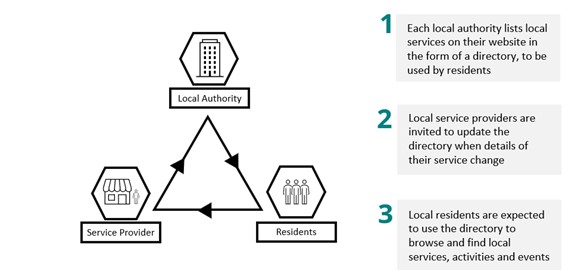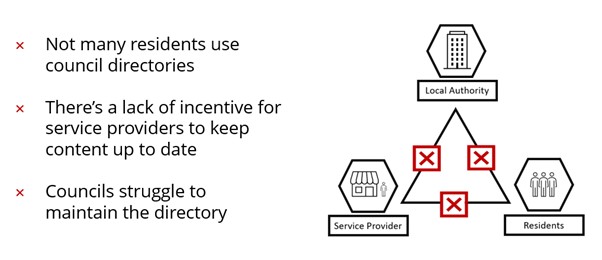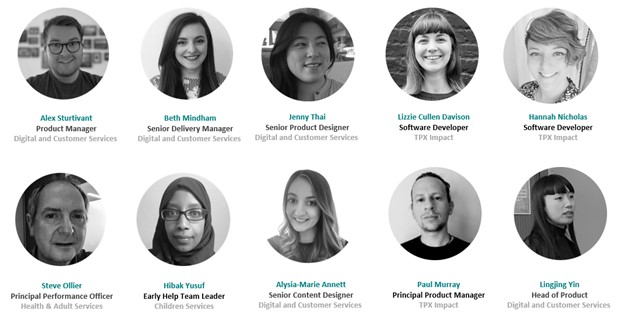Join us on a mission to build a reusable open-source community directory product for Local Gov
Product Manager Alex Sturtivant explains our ambition to join forces with other local authorities and build a reusable community directory product that better meets the needs of residents, service providers and staff.
In the Digital team at Royal Greenwich, we have a mission to make it easier for residents to understand and connect to the support available in their local community. But we don’t want to do this alone. We've secured funding from the Local Digital Fund to create a reusable community directory product, designed and built collaboratively with other local authorities. We'd like to speak to local authorities who are interested in joining us on this exciting mission - read on to find out what we've been up to and how you can get involved.
The need for a community directory
All local authorities in England have a statutory duty to provide information about services that are available in the local area. This is often published in the form of an online directory (like an A-Z). In the Royal Borough of Greenwich, we have the Greenwich Community Directory which lists over 2,600 services. Some common services listed on the directory are to support people with:
-
looking after their physical and mental health
-
children with special educational needs or disabilities
-
living independently
-
childcare arrangements
A catch-22 situation
To help residents find local services and meet the statutory requirements, many local authorities follow a similar process in which:
-
the local authority lists local services on their website in the form of a directory
-
local service providers are invited to update this directory themselves
-
residents are expected to use the directory to connect to local services and activities

However, from reviewing existing data and our research with over 70 residents in the borough, we know that the Greenwich Community Directory isn’t well-used or well-known. Because of this, the process doesn’t work as expected and maintaining the directory becomes harder.
For residents, we heard that a lot of people use other channels to find local information: word of mouth, social media and printed leaflets were frequently mentioned. We also have an assumption that people don’t consider their council border when looking for local services, especially in London where people might live, work and socialise in different boroughs.
"My daughter's school has a parent WhatsApp group where you can see what's going on and things to do. People send events to keep the kids entertained at half term." – parent in Greenwich
For service providers, there isn’t enough of an incentive for them to publish or update their service information on a directory that isn’t being used by many residents. Content on the directory then becomes out of date and inaccurate. This reduces people’s trust in the directory, adding to the problem that few people use it.
We ran some experiments to see if we could find different ways to nudge or incentivise service providers to keep their content on the directory up to date. These weren’t as effective as we’d hoped. We concluded that the only way service providers would keep their content on the directory up to date would be if they knew residents were using it.
“I'm so busy. We have a tiny team and we do a lot of the promotion stuff ourselves. If I were to promote our service anywhere it would probably be at events or I might update our Instagram page. We don't even have a website.” – Local Service Provider in Greenwich
For a local authority like Royal Borough of Greenwich, it requires expertise and a lot of time to keep service listings on a directory up-to-date, useful, and organised. This is difficult to maintain when the directory is often looked after by a small team, with technology which is hard to use.

Solving common problems with help from the Local Digital Fund
We’ve met with lots of local authorities who told us they’re experiencing similar problems. This means there are several local authorities investing time and money in directory products which aren’t adding significant value. We need to find a way to make community directories better meet the common needs of residents, service providers and councils. This way we can make them more sustainable to maintain, while also meeting statutory requirements.
Since Autumn 2021, our dedicated product team at the Royal Borough of Greenwich has been working to design and build a better community directory. We received £350,000 from the Local Digital Fund (part of the Department of Levelling Up, Housing and Communities) to create an open-source community directory product, designed and built collaboratively with other local authorities. Our pledge was to share everything we’ve learned to ensure the service, products, technology architecture and maintenance model we establish for Greenwich can be reused by as many local authorities as possible.
We believe a deliberate effort like this will help to lower the cost of maintaining and developing service directories across the sector. It’ll also give local authorities more power to work together and shape an experience that will better meet user needs.
Building on existing products, standards and research
It will waste time if we start everything from scratch. Our product team has reviewed a lot of work done in this space and has spoken with a wide range of local authorities and organisations who have solved similar problems.
We have decided to adopt Open Referral UK as our data standard and identified Outpost as a good open-source directory product to build on. This means we can achieve our goal of creating a truly reusable service directory product in much less time. We are currently working with our product partner TPX Impact to make Outpost more robust and easier to adopt by others.
Creating an open-source, easy to adopt product in collaboration with the local gov community
To deliver our mission, we’d like to achieve these five outcomes:
-
For residents and referrers: It’s easier for them to find local services which will have a positive impact on their lives, or the life of someone they’re working with.
We’re in the process of designing a resident-facing community directory which makes it easier for residents to understand and connect to the support available in their local community. -
For service providers: It’s more efficient to publish up-to-date, relevant information about their services, so they can connect with their target audiences faster.
Through ongoing local design, and iterative test and learn, we are making Outpost more robust and easier to adopt. We’d like to work with other local authorities who have an interest in doing the same and use the feedback to enhance and iterate Outpost. -
For council staff: It requires less effort to quality control and maintain information about local services.
We’re exploring a number of options of technology architecture to ensure Outpost can be deployed to suit different content management models in different local authorities. Community feedback will influence the ultimate architecture direction. -
For the overall ecosystem: Public-facing information about local services in Greenwich is more accurate, relevant, and accessible.
We are currently working with Greenwich residents, service providers and practitioners who play a key role in helping people navigate and manage information, advice and services to achieve this outcome. We're using mixed methods of service design, content design, resident co-design and rapid prototyping. -
For the local gov sector: we’re working more efficiently and effectively by solving common problems through reusable solutions.
We want to work closely with like-minded local authorities to deliver this mission and shape something that is truly useful for the sector. We are inspired by initiatives like LocalGov Drupal which is built and maintained by a community of developers, content designers and digital leaders from local authorities across the UK.
If this mission speaks to you or aligns with what you’re doing, we’d love to hear from you
We are a bunch of creative, compassionate, and mission-driven people. We want to create a community of local authorities who want to work together to develop an open-source community directory product that better meets the needs of residents, services providers, and councils. We’re not quite sure what this community will look like yet, this is something we’ll shape together.

We think the level of involvement will depend on individual councils, but at a minimum we’d like to meet for at least 1 hour every 3 to 4 weeks.
If you’re in the early stages of a project to improve your community directory, or if you have it as a project on the horizon, we’d love to hear from you and see if there’s an opportunity to work together.
You can reach out to me (Alex Sturtivant, Product Manager at Royal Greenwich) by sending me an email on alex.sturtivant@royalgreenwich.gov.uk
Stay in touch
You can also follow the development of this piece of work. We will publish our Show and Tells and reflections on that page.